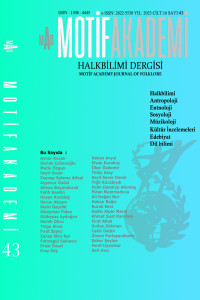LETONYA’NIN UYANIŞI: JĀZEPS VĪTOLS’UN LETONYA HALK ŞARKILARI FANTEZİSİ ESERİNİN ULUSAL MÜZİK BAĞLAMINDA TEMSİLİ
LATVIA’S AWAKENING: THE REPRESENTATION OF JĀZEPS VITOLS’ FANTASY OF LATVIAN FOLK SONGS IN THE CONTEXT OF NATIONAL MUSIC
Author(s): Burak EKER, Hakkı Alper MERALSubject(s): Customs / Folklore, Music, Cultural Anthropology / Ethnology, Sociology of Art, History of Art
Published by: Motif Halk Oyunları Eğitim ve Öğretim Vakfı
Keywords: Latvia; Latvian Folk Music; Jāzeps Vītols; Violin; Latvian Folk Song Fantasy;
Summary/Abstract: Latvia has historically been a region where different ethnic groups have lived together. Although this ethnic diversity offers a great cultural richness, German culture has dominated over the years, in line with the wishes of the administrative dominance mechanisms over the region. Latvia’s unique cultural character began to be explored in the twentieth century as a result of national movements. These studies, which emerged in Germany as an extension of the “Young Germans” movement, were interrupted by the Russification policies carried out during the Soviet Union. One of the areas that came to the forefront in the studies aimed at revealing the national culture was folk music. It has been observed that the songs named “Daina”, which reflect Latvia’s cultural diversity and convey the way of life through pagan beliefs, contain a very rich material in terms of both text and melody. Jāzeps Vītols, one of Latvia’s most important composers, took part in the compilation of these melodies. As one of the first representatives of the national school of composition, one of Vītols’ works reflecting Latvian music is his Latvian Folk Song Fantasy for violin and orchestra. In this study, Latvia’s position in the historical process and the emergence of folk music as a cultural subject as a result of national awakening and its transfer to a work within the traditions of Central European music as a common practice of the period are examined. It is aimed to analyze the relevant work of Vītols by determining the characteristic features of Latvian folk music together with the reflection of the researches on the history of the region and national culture on music and to reveal the presence of folkloric elements in the work within the framework of the mentioned perspective. Descriptive research techniques were used in the study. Relevant information was compiled using the document analysis method, one of the qualitative research methods, and the data obtained were evaluated with the descriptive analysis technique. When the data obtained as a result of the study were analyzed, it was determined that Vītols conveyed the character of Latvian folk music as a result of using certain melodies in folk music and various variants of these melodies in his Latvian Folk Song Fantasy.
Journal: Motif Akademi Halkbilimi Dergisi
- Issue Year: 16/2023
- Issue No: 43
- Page Range: 1285-1306
- Page Count: 22
- Language: Turkish

